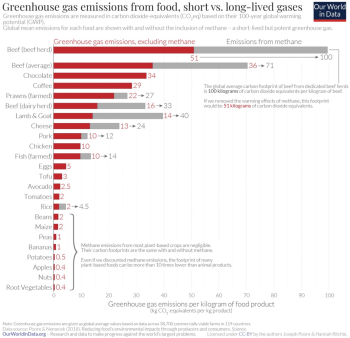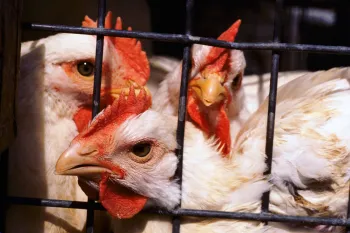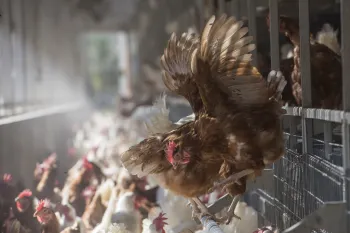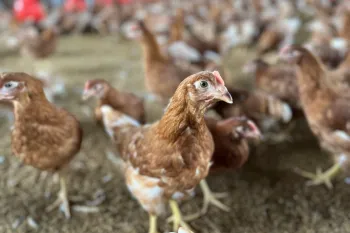In light of the urgent need to address climate change and promote sustainable practices in agriculture and other sectors, there is a growing realization that our food choices matter. Some people believe that switching from beef to chicken sufficiently addresses climate concerns when it comes to diet, but when compared to non-meat sources of protein, chicken production is still the source of significantly more greenhouse gas emissions.
Plus, switching from the highest carbon meats to slightly lower carbon alternatives (from beef to chicken, for example) does not address the ethical dilemma of factory farming. In the end, raising animals at such a large scale poses significant problems, not least of which is the perpetuation of the danger of the spread of zoonotic disease, as we’re seeing with bird flu once again. And, of course, factory farming supports the food system status quo of massive animal suffering.
This reality underpins our approach to food reform, recognizing that changing this status quo is in the interests of our own species, other animals and the planet. We have been working with the food service industry for a decade to encourage the purchasing and serving of more plant-based foods in place of animal products. In the U.S. alone, this industry serves billions of meals each year at schools, colleges, corporate headquarters, stadiums and public venues. In the course of our outreach, we’ve seen a range of positive outcomes.
Simply put, eating more plant-based meals means eating fewer animals—which dramatically reduces the amount of animal suffering in our food system. It also reduces the justification for a reckless approach to American agricultural production that involves raising billions of animals for food each year, polluting our air and water and using a tremendous quantity of land, water and other precious natural resources.
Creating a truly sustainable future means embracing plant proteins, and the companies that ranked the highest in our recently published Food Service Industry Protein Sustainability Scorecard are taking the right steps.

The scorecard evaluates and recognizes food service companies that prioritize sustainability and animal welfare by offering more plant-based meals on their menus. The report focuses on three critical dimensions of effort to determine how much a food service company is doing when it comes to sustainability and alternative proteins: transparency, goals and a plan of action. We are driving meaningful change in the food industry by collaborating with these companies to incorporate plant proteins and reduce their reliance on animal products. Here are a few of the top-ranked food service companies and what they had to say about their plant-based programs and our work with them:
- Sodexo. “Sodexo is committed to driving positive change in the food industry through responsible sourcing, plant-based eating, reducing food waste, and other sustainability initiatives.” —Sarosh Mistry, CEO of Sodexo North America
- Whitsons Culinary Group. “At Whitsons, we're dedicated to fostering a greener future. We believe that offering plant-based options is key to achieving sustainability goals, as it not only decreases our carbon footprint but also promotes healthier choices and enhances food security. Our partnership with the Humane Society of the United States has been invaluable .... Together, we're pioneering innovative, sustainable plant-based meals, furthering our mission of environmental stewardship. Whitsons is proud to lead the charge towards a more sustainable tomorrow.” —Karen Dittrich, Vice President of Marketing and Communications
- HHS, LLC. “Partnering with The Humane Society of the United States has been instrumental in our mission to champion a plant-based, sustainable menu program. Their support has fueled initiatives like Sustainabowls and Meatless Mondays, propelling us towards increasing plant-based meals to represent 50% of our menu offerings by 2027.” —Marta Hernandez, Vice President of Culinary
Here is a snapshot of just a few of the companies that could be doing much more:
- HMSHost operates in more than 140 airports with huge potential for sustainable impact. Tell HMSHost that its sustainability plan is too vague and should include a public, measurable plant-based goal and timeline, and increased transparency around any plant-based initiatives.
- AVI Food Systems serves meals in a broad spectrum of dining operations. Tell the company it should share its sustainability initiatives by setting a target to increase plant-based options or reduce animal protein purchasing.
- OVG Hospitality serves millions of meals a year at stadiums sports venues across the country. Tell OVG Hospitality that it should include increasing plant-based meals as a part of its sustainability goals.
Creating a sustainable future is a collective effort, and each one of us can contribute to the cause. The most significant way to make a difference is by choosing the plant-based options offered at grocery stores, restaurants, schools, hospitals and stadiums.
You can be part of this meaningful change. When you are at a restaurant or visiting a school, stadium or hospital, if a variety of plant-based options aren’t available, speaking up and politely requesting more is a meaningful way to push the needle. Raising awareness in this way will help make our world a kinder, more sustainable and humane place for ourselves and for future generations. You can also reach out to the food service companies that didn’t perform as well on this year’s scorecard and express your desire to see more plant-based meal options on menus.
Follow Kitty Block @HSUSKittyBlock.




